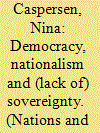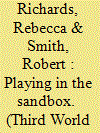| Srl | Item |
| 1 |
ID:
104113


|
|
|
|
|
| Publication |
2011.
|
| Summary/Abstract |
Unrecognised states are among the least likely candidates for democratisation: they tend to be driven by ethno-nationalism, many are marked by the legacy of war and most are facing international isolation. Nevertheless, the claim to democracy has become a central part of their legitimising narrative. This article examines this apparent paradox and finds that neither ethno-nationalism nor non-recognition represents insurmountable barriers to democratisation. However, what we tend to find in these entities is a form of stagnated 'ethnic democratisation'. These findings throw new light on the relationship between democracy and nationalism; they highlight the importance of (lack of) sovereignty; and they are used to evaluate Sammy Smooha's concept of 'ethnic democracy'.
|
|
|
|
|
|
|
|
|
|
|
|
|
|
|
|
| 2 |
ID:
141140


|
|
|
|
|
| Summary/Abstract |
For unrecognised states in the international system recognition of sovereign statehood is the ultimate goal. Not being ‘a state’ means being excluded from global networks. However, even in the most basic definitions and criteria for unrecognised states there is a period of relative autonomy accorded due to non-recognition. This is a period when political actors can use isolation to establish the state’s narrative, identity and structure. It is this period that provides the foundations for external interaction. It is in this period that the state is born. This article examines another side to the politics of recognition: the politics of non-recognition. Drawing on the contemporary examples of Somaliland and Kurdistan, the article assesses the benefits as well as the costs of non-recognition.
|
|
|
|
|
|
|
|
|
|
|
|
|
|
|
|
| 3 |
ID:
144775


|
|
|
|
|
| Summary/Abstract |
This article focuses on how unrecognised states have tried to establish themselves domestically and internationally, and on the efforts of base states designed to counter these initiatives. Having provided an overview of the main features of post-Soviet unrecognised states, we examine the political systems found in these territories, focusing on their presidents, parliaments, and elections. We then focus on how unrecognised states strive to strengthen themselves through support from abroad, in spite of international isolation. Finally, we debate the strategies enacted by base states to counter such efforts and deny international legitimacy and recognition to these entities.
|
|
|
|
|
|
|
|
|
|
|
|
|
|
|
|